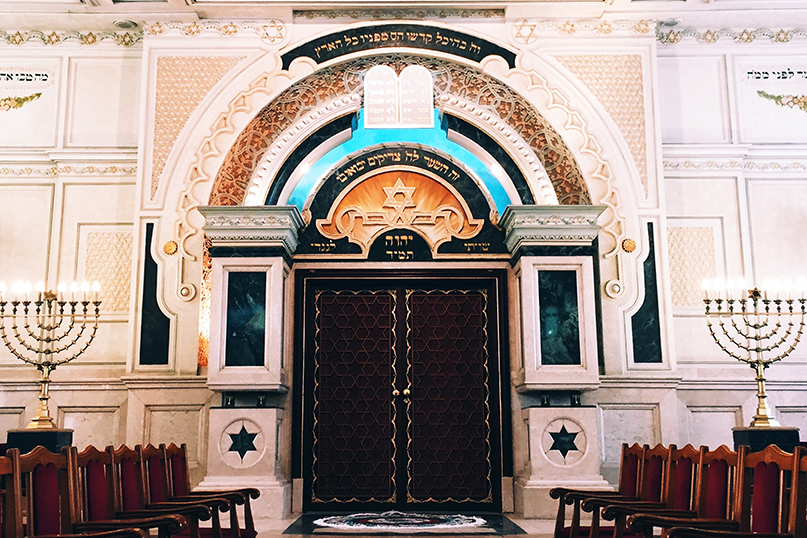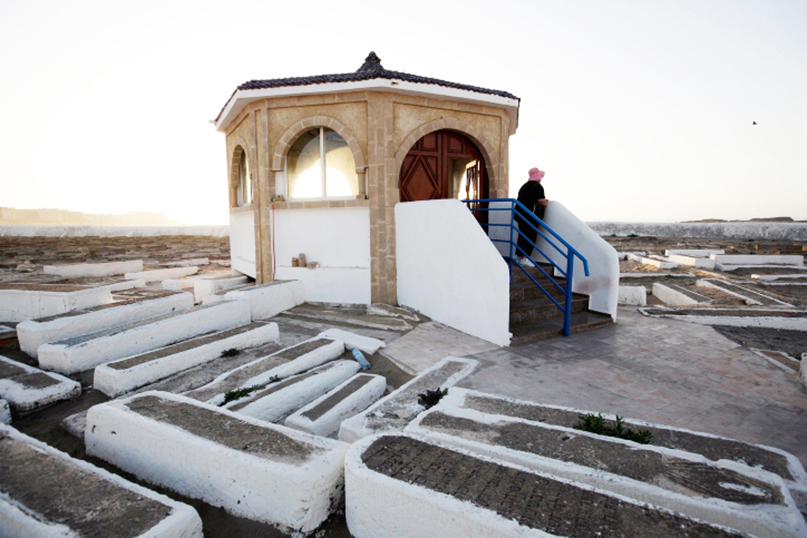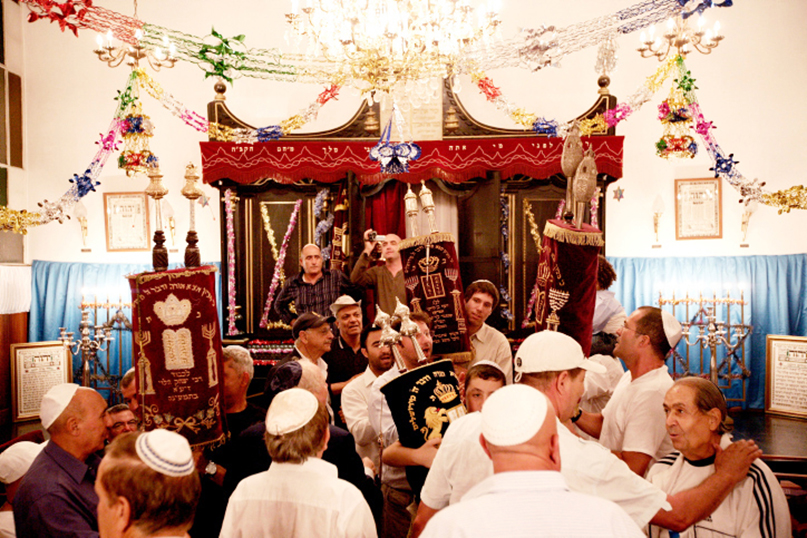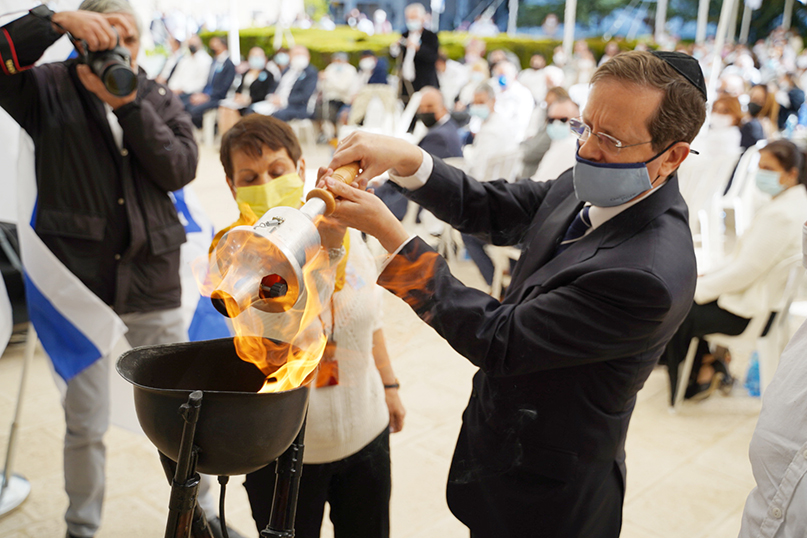
Moroccan Jews reflect on their heritage and tradition post-normalization with Israel
By Eliana Rudee
Introducing a new JNS series highlighting Jewish ethnic minorities, that aims to elevate their voices, and in turn, celebrate the beautiful mosaic that is the Jewish people.
(JNS) In December 2020, the Kingdom of Morocco agreed to establish formal diplomatic relations with Israel, following the success of the Abraham Accords between three Arab countries – the United Arab Emirates, Bahrain and Sudan – and the Jewish state.
The normalization of ties has already resulted in the reopening of Israeli and Moroccan liaison offices with the intention of opening reciprocal embassies in Rabat and Tel Aviv. The country has become the first to start teaching Jewish history and culture in its schools. Official contacts, economic cooperation, and direct and overnight flights between the two countries are also in the works.

According to Moroccan Jewish leader Rabbi Gad Bouskila of the Orthodox Netivot Israel Synagogue in Brooklyn, New York (the first Moroccan Jewish community in the state), the recent normalization has made the Moroccan Jewish community in North America “very happy” for each of their homelands.
“We visit Morocco often, so this relationship will allow many young Moroccans born in Israel, who were not yet able to travel to Morocco, to see the roots of their grandparents,” he told JNS.
The roots of the ancient Moroccan Jewish community date back more than 2,500 years, with many Jews settling in the city of Fez, bringing their economic capabilities that contributed to the “golden age” of Morocco from the ninth to 11th century, when Jews were numerous and powerful in the region.
Following the establishment of modern-day Israel in 1948, many Jews of the 238,000-strong population of French Morocco (in addition to the 15,000 in Spanish Morocco and 12,000 in the international zone of Tangier) were forced to leave. In January 1961, following the death of King Mohammad V, Morocco tightened its restrictions on Jewish immigration, causing nervousness among its Jewish community. Many left for Israel and French-speaking areas in Europe and Canada, and for those who had family there, the United States.
Following the mass exodus, Jewish institutions in Morocco, including schools, yeshivahs and synagogues closed, and anti-Jewish propaganda increased. Today, the Jewish population in Morocco stands at just 2,100 people, while there are one million Moroccan Jews living in Israel. Le Monde estimates that 40,000 Moroccan Jews reside in France and 27,000 in Canada, with approximately 25,000 in the United States, according to the American Sephardi Federation, and other dispersed populations in South America and Europe.
According to a Central Bureau of Statistics report in December 2011, Moroccans constitute the second-largest Israeli Jewish community after Russian Jews.
Among Moroccans who left their birthplace suddenly, their story is that of regained confidence and pride in retaining their culture.
Jewish Moroccans in the United States
“Thirty-five years ago, I witnessed a big assimilation of Moroccan Jews to the tri-state area, and I opened the first-ever synagogue for Moroccan Jews in the area,” recounted Bouskila. “That gave them an identity and helped bring back their confidence, and now they are proud to transmit their heritage and tradition to their children.”
In the North American community, explained Bouskila, he teaches classes for children and adults, as well as traditional piyyutim (Jewish liturgical poems) and traditions to retain Moroccan culture. “A majority of the Moroccan Jews follow the traditions,” he added, noting that Moroccans hold family and food to be central to their heritage.

Moroccan Jews enjoy success in “every field and profession, and especially real estate and in Hollywood” with no particular challenges as a result of their heritage, according to Bouskila, and are considered in “good standing, well-respected and accepted” among other Jewish and non-Jewish communities in the area. They are especially successful in promoting interfaith dialogue, Holocaust education and promoting the IHRA definition of antisemitism among African and Arabic nations, he added.
Many Moroccan Jews in North America, even second and third generation, still speak some French, though Bouskila noted that “some are too American for it,” and only a few still speak Arabic.
Jewish Moroccans in Canada
Dan Illouz, 34, was born and raised in Montreal and now lives in Jerusalem, where he is a member of the Jerusalem City Council. “In Montreal, I was part of the Moroccan community that came to Montreal starting in the 1960s,” he said. “At the time, there was a cocktail of reasons for Jews to leave Morocco, including fears because of the change in political leadership in Morocco, economic reasons and a general feeling that the establishment of Israel might bring the frictions between Jews and Arabs to Morocco.”
Today, explained Illouz, the strength of the Moroccan Jewish community in Montreal can best be explained by the language barrier that “encouraged the Moroccan community to establish its own institutions from the get-go,” as well as Canada’s encouragement of multiculturalism.
With more than 20,000 Jews in Montreal, he related, “Montreal is a bilingual city, and while Ashkenazi Jews were mostly Anglos, Moroccan Jews were Francophones. When they arrived in Montreal, they established French-speaking synagogues, schools and community centers. The relationship between the communities was positive, but the language barrier created these different institutions. The result is that the Montreal community kept authentic Moroccan traditions in a way that is hard to find in any other country, including Israel.”
Illouz spoke of being raised with a “high level of Moroccan pride, understanding the richness of our culture.” He learned about Fez, the city where his father was born, where Maimonides lived and where there is, according to The Guinness Book of Records, the oldest university in the world. “I knew about Safi, the city where my mom was born, that is considered a world-leader in ceramic arts. At school, we learned piyyutim, and we would hear Andalusian music at home.”
“I think the source of strength for Moroccan culture was that it was always a window for Western Europe into both Africa and the Arabic world, and this created a situation where local culture was enriched by diverse sources of inspiration,” he said.

Because Canada is a multicultural society, he continued, “this allowed us to keep our culture while feeling Canadian. I remember the TV being on during Mimouna” – a traditional North African Jewish celebration to mark the end of Passover and the return to eating leavened bread and flour products; this year it starts on the evening of April 4 and lasts through the evening of April 5–“showing the hockey game of the Montreal Canadians, and that memory pretty much says it all.”
While noting that “Canada is a great country, and I did not flee it,” Illouz said he decided to move to Israel as a result of his Zionist beliefs. “I wanted to end my family’s 2,000-year exile and come back home, to a land I love deeply, and to take part in the greatest Jewish project of history. I did not run from anything but rather ran to something, and I have since not regretted it for even a second.”
“While Canada is a great country, there is no country like Israel for Jews,” he said.
Jewish Moroccans in Israel
Once Illouz made aliyah, he learned that during the early years of the State of Israel, like other Mizrachi Jews, Moroccans were discriminated against in a society that was run by Ashkenazi Jews from Eastern and Western Europe, and experienced “deeper challenges that had to do with disdain for Moroccan culture, probably because it was associated with our Arab enemies,” said Illouz.
Many of the Jews who emigrated from Morocco were placed into immigrant absorptions centers, development towns and ma’abarot in the Negev Desert and along Israel’s borders – areas that Illouz noted have “now grown into cities with a vibrant culture.”
Moroccan culture continues to be a part of the great mosaic Israel offers, he added.
In the context of expanded diplomatic relations between Morocco, Illouz claimed in a speech to the city council that “this is not only a diplomatic agreement but also a cultural revolution.”
“After all these years in which Moroccan culture was shunned by mainstream Israel, it can now receive proper appreciation because it is not the culture of an enemy but of a friend,” he said. “Israelis will get to know Morocco in a different way and will get to appreciate things that were not appreciated enough. The day the agreement was announced was a day of great happiness for the whole community, and I think this is the deeper reason for that happiness.”
Where Moroccan heritage used to be associated with a “lower culture” and non-Moroccan Israelis encouraged Moroccan Jews to assimilate into the new identity of the “New Jew,” because of their strong culture that “includes culinary and artistic aspects, but also a sense of solidarity that exists between people who are part of the same community,” emphasized Illouz, adding that was a reason Moroccan Jewish culture was largely retained.
“While the language has not been preserved, almost every other aspect has been,” he said. “I actually think that Moroccan culture has become a large part of Israeli culture, and I think we will see this even more clearly when Ashkenazi Jews go to Morocco and realize how similar the cultures are.”
Illouz shared his vision for an Israeli culture where each demographic that made aliyah from the Diaspora “can retain its roots and make them a part of a mosaic that we can all enjoy.”
“This enriches Israeli culture,” he said. “I love learning about Persian, European and Ethiopian culture from my fellow Israelis and am sure I can offer some of my Moroccan heritage. In the long term, this will create a much richer Israeli culture than an artificially created melting pot.”
Yom Hazikaron ceremony pays tribute to victims of the sinking of the ‘Egoz’
(JNS) The Jewish Agency for Israel’s annual Yom Hazikaron ceremony – Israel’s Memorial Day – held on Wednesday, April 14, honored a tragic event in Jewish history, as well as fallen soldiers, terror victims and those injured or killed in antisemitic attacks.
In 1961, during a secret mission intended to bring Jewish Moroccan immigrants to Israel, the Egoz ship sank, resulting in the loss of 44 people.
Among those on the ship were 43 immigrants, half of whom were children, in addition to Mossad operative Haim Tzarfati. Authorities were able to locate 22 bodies, which were then buried in a Jewish cemetery, but the rest were lost at sea. In 1992, the bodies were moved to Jerusalem’s Mount Herzl, where they were given a ceremonial burial.
“Our hearts are heavy with grief for every man, woman and child who died simply because they dared to be part of the miracle that is Israel,” said Jewish Agency chairman Isaac Herzog. “Today, we unite behind and honor their individual stories. We especially remember those tales of hardship and sacrifice in order to become Israeli.
“In that vein,” he continued, “we pay tribute to the victims of the Egoz ship and Haim Tzarfati. They set sail from Morocco on a stormy winter night 60 years ago and never reached their destination. Some 44 people lost at sea – children, women, men – Jews whose only desire was to start a new life in the Land of Israel. The ship sank but did not drown the longing for Zion.”
Herzog and Gila Gutman Azulay, who lost the majority of her family on the ship, both lit a torch to commemorate the victims and the men and women who died defending Israel.
“The tragedy of the drowning of the Egoz ship is a national and a personal tragedy. At home in Casablanca, I was always given the feeling that life in Morocco was temporary. We all longed for the Land of Israel, it was our soul’s desire,” said Azulay. “My sister Penny and I joined a local underground organized group of children set to immigrate to Israel and were told that the rest of our families would join us later. We did not say goodbye to my mother and my siblings. I couldn’t have imagined that we’d never see them again. A few days later, my mother and five brothers and sisters perished in the disaster.”

The memorial event was organized with the participation of the World Zionist Organization, the Jewish National Fund, Keren Hayesod, Jewish Federations of North America and the Jewish Federations of Canada.
A memorial wall of worldwide victims of antisemitism was also unveiled at the ceremony. According to data from the Jewish Agency, since the establishment of the State of Israel in 1948, some 200 Jews have been killed in antisemitic incidents and terror attacks around the globe.
“Our demand from every state and government is clear and unequivocal: The Jewish citizens living in your country are equal citizens. It is your responsibility to keep them safe,” said WZO chairman Yaakov Hagoel. “The World Zionist Organization is committed to battling antisemitism around the world and will stand its ground as one of the leaders in the fight against this horrid phenomenon. We embrace Jewish families from around the world for the precious loss and the endless dedication they have given us as a country.”
Main Photo: Interior of Temple BethEl, an Orthodox synagogue in Casablanca, Morocco, that is often considered the centerpiece of a once vibrant Jewish community.








 Southern New England Jewish Ledger
Southern New England Jewish Ledger













